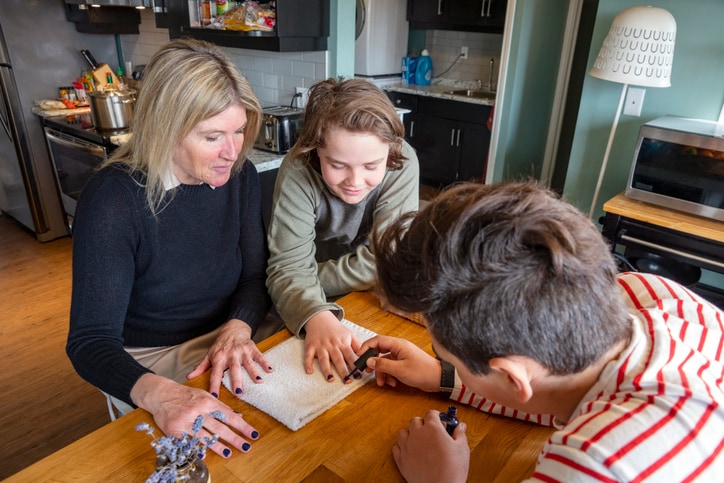My loved ones recognized my brilliance early in life. By age 4, I answered the phone by saying, “May I ask who’s calling,” and, “Can I take a message,” before passing clear summaries to the corresponding loved one. At 7, I wrote stories and poems to contemplate my deep feelings and the depth of existence. I always had a challenging question to stump adults in my back pocket. But, they also noticed that I was extremely talkative, disorganized and occasionally impulsive.
These qualities followed me to school, where my messy handwriting and sloppy assignment drafts mirrored the chaos of my bedroom, and all were interpreted as laziness or apathy. I was considered “disruptive” because I passionately volunteered answers in class when teachers wanted other students to answer. Having grown up in Dallas when corporal punishment was still common in school, I vividly remember waiting in anticipation of being hit by my principal with a large wooden paddle. Between hits, I remember being told that if I could just learn to control my mouth, this wouldn’t happen. The response I got at school suggested I wasn’t trying hard enough, and I believed them.
Neurodivergence in marriage and motherhood
I did what I could to blend in. I finished school, eventually getting a graduate degree, but things didn’t necessarily become easier. The dysfunction followed me through marriage and motherhood, and my children showed similar behaviors to mine with time — wildly intelligent but somehow aloof, they struggled to follow simple instructions.
“Meeting my children’s intellectual needs sometimes felt like a full time job. I was stunned at the beauty of their minds, but often cried knowing they wouldn’t obey any instruction that didn’t make sense to them from every angle.”
My son taught himself to read before 4 years old and asks questions that make me freeze in my tracks. My daughter shows up as herself and moves through life with a self awareness and confidence that leaves adults envious. Meeting my children’s intellectual needs sometimes felt like a full time job. I was stunned at the beauty of their minds, but often cried knowing they wouldn’t obey any instruction that didn’t make sense to them from every angle. They peppered me with rapid-fire questions and their desire to know how everything works and why from first breath to last kiss goodnight.
I wasn’t alone, but as a military spouse who spent a lot of time solo parenting, I felt perpetually alone. I was drowning, trying to manage their disorganization and mine, until a therapist offered me a reframe: I wasn’t a lazy child or a bad mother. I’m a neurodivergent person who struggles with executive functioning.
Understanding executive function
“Executive function is like the air traffic control of your brain,” says Natasha Nelson, a certified positive discipline educator, the found of Supernova Momma and a mother with attention-deficit hyperactivity disorder (ADHD) and autism. “It [has control] over your emotions and keeping your feelings in check. It’s over your flexible thinking — adjusting your behavior to new rules or changes in the routine, [and] it’s over your organization — keeping track of things physically and mentally.”
The more I learned about executive function, the less I understood why others didn’t see my struggles. As a child, the “simple things” always seemed complicated to me, and as an adult, this struggle continues. Many days, I need my husband to “translate” the instructions for my work. Sometimes it feels easier to forgo payment for writing assignments than to struggle through the paperwork required for payment. For a long time, I didn’t understand how I could feel so smart one moment, and incredibly incompetent the next.
“I’ve encountered countless mothers like me, who couldn’t recognize their neurodivergence until they sought support for their children.”
Research suggests 15 to 20% of the population is neurodivergent — a term which includes many conditions, such as ADHD, autism, anxiety and obsessive compulsive disorder (OCD). Many neurodivergent individuals are children, but Destiny Huff, a licensed professional counselor and special education parent advocate, says many of those kids don’t receive formal support in school. Sometimes this is because they don’t need it. Other times — especially for those who show signs of giftedness and keep up with class work, as I did — it’s because they slide under the radar.
“If it’s not impacting their behavior or academics, they’re not going to see the need for them to have any accommodations or modifications,” she says. “Nobody notices until they become adults and have those functioning struggles.”
Women and girls are also underdiagnosed with ADHD and other neurodivergent conditions. I’ve encountered countless mothers like me, who couldn’t recognize their neurodivergence until they sought support for their children. Often, these struggles happen behind closed doors, but to others they can look like failing to manage bills and emotions or forgetfulness.
My parenting experience proves this. To others, I was parenting based on my goals. But I knew I wasn’t managing our time or holding consistent boundaries. I wanted a more stable mother for my kids. I wanted better skills for them as well.
Embracing a new way of thinking
I sought occupational therapy, hoping to help my children get a head start managing some of the same behaviors that caused me to struggle. I found talking with an affirming occupational therapist (OT) who was also neurodivergent taught me our situation wasn’t hopeless. But, I still had some healing to do in order to be able to support my children.
As the therapist explained executive function and sensory needs, I got to reframe my childhood behaviors. My constant talking and fidgeting weren’t an intentional effort to annoy my teachers and loved ones as everyone thought; they were attempts at self-regulation. Similarly, my messy room and handwriting weren’t laziness; they were examples of me trying to manage life’s demands as my brain raced. Nelson notes that the realization that one needs support with executive function is freeing amid mischaracterizations of being lazy or uninterested. I was happy we had hope.
It felt good to learn new ways of understanding myself and my children, and to begin to make sense of my experience. But, it was also daunting to know I’d have to create an environment where my children could get the structure and consistency they needed to thrive, especially when I haven’t always managed to do that for myself. Huff notes that parents need to know they don’t have to try every solution experts offer. Instead, she says to find the shifts that work for your family dynamics and benefit the entire family when possible.
Finding support to thrive
I’ve learned that the tools that keep my children on track work for me, too. The occupational therapist taught me to minimize my overwhelm by breaking big tasks into small pieces and using visual timers. These strategies also help my children stay on track with chores. A schedule template we received from the OT helps me remember when to eat meals and keep the children used to a flow. I’ve started reading books like “Peak Mind” by Amishi P. Jha, which supports improving attention and developing a mindfulness practice. I tell my kids when I don’t know the answer to something, and when I need space and for their questions to pause.
“I’m not ‘broken or lazy.’ I just have different needs. Like my kids, I need regular breaks, space to think creatively and the freedom to take the scenic route to solutions.”
I realized that for years I’d been trying to work based on standard (read: neurotypical) work plans. Now, I know that making targeted lists and completing my work in 30 to 45 minute circuits where I break longer than I work helps me meet my needs. Using read-aloud and voice-to-text software helps me understand emails and instructions. I’ve learned it’s OK if I have to listen to something five or six times, and I work better with virtual coworking or chatting on the phone.
Learning about executive function taught me that I can work with my brain and its processes instead of against them. I’m not “broken or lazy.” I just have different needs. Like my kids, I need regular breaks, space to think creatively and the freedom to take the scenic route to solutions.
My children and I are early in our journey. I’m not ready to seek official diagnoses for them yet. Instead, we’re establishing new routines and identifying the accommodations we need. I do know that I’m a gifted neurodivergent mama with two gifted neurodivergent children who constantly teach me new lessons about the world. And, as we find the support they need so they can thrive, I’m finding mine, too.






